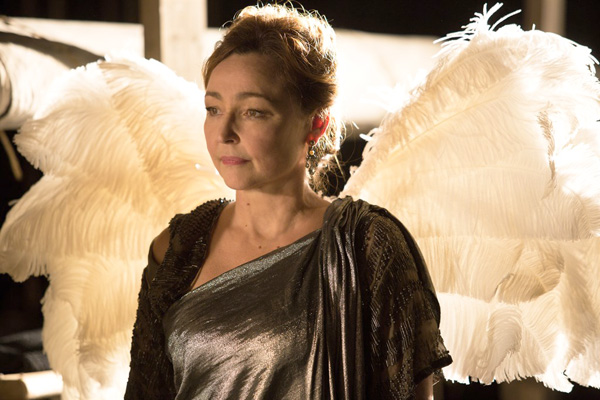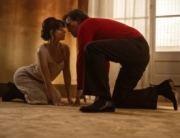What is it about the notoriety of Florence Foster Jenkins that has fascinated storytellers? In New York of the early 20th century, she woefully warbled off-key in recital halls before invitation-only audiences and (in)famously performed at Carnegie Hall. She has been the subject of a mildly amusing 2005 Broadway play, Souvenir, starring Judy Kaye, and Meryl Streep has recently undertaken to play her in a film by Stephen Frears that will come out later this year. French writer/director Xavier Giannoli, though, has beaten that production to the punch with his deluxe variation of Jenkins’s biography. Its sober tone matches the muted, digitally colorized palette, deflating any expectation of a campy confection.
Giannoli transplants the setting to 1920 France, renames his aspiring songbird Marguerite Dumont (which sounds like the stage name of a silent film star), and makes his attraction to her myopic musical mission acerbically clear. Though the film deliberates on the aspirations of this rich, neglected wife of an industrialist—and a baroness to boot (rumor has it she bought her husband’s title)—it equally ponders her accommodating circle of fawning flunkies. While Marguerite may not have the singing ability to command a stage, she is nevertheless a star, the center of an orbit, with all the adoration that money can buy. The mystery is not so much how Marguerite can’t realize she’s tone-deaf but why no one swirling around her has the temerity to tell her the truth. Everyone is an actor here of one sort or another, perpetuating a deceit.
The director gets the laughs out of the way in the prologue, which takes place at a charity concert for war orphans held in her husband’s Xanadu-like estate near Paris: among the menagerie are a python and a screeching peacock. The audience (watching the film) has an inkling of what’s to come as two Bright Young Things, a critic, Lucien (Sylvain Dieuaide), and his poet companion snicker in anticipation. As Marguerite (portrayed slyly and with grace by Catherine Frot) slaughters the “Queen of the Night” aria, it’s easy to call to mind the preening peacock that rules the estate’s gardens; additionally, Marguerite tops her turban with a peacock feather that bobbles in the air as she wildly gesticulates.
The self-described coloratura’s thoughts are elsewhere, undeterred by the concertgoers’ looks of horror and the derisive laughter. “Poor Mozart,” blasts one review headline the following day, and in his review, Lucien accuses her of “exorcising an inner demon.” Even her husband admits to his mistress that to him, his wife is “a sort of freak.” His extramarital affair adds to the film’s growing list of what’s left unspoken.
Here and there, Marguerite drops her mask, fleetingly revealing that she may not want to hear what someone might have to say. Perhaps deep down somewhere, she knows she’s a fraud, or, if that’s too strong a word, at least inadequate. Perhaps her Sphinx-like composure is only a front, as though she knows fully well when her husband is lying to her, which he does, a lot—and not just about her singing.
If she has a sense of entitlement, it’s more of a young girl seeking approval. Far from a demanding diva, she behaves regally, a paragon of noblesse oblige. When the journalist Lucien warns her to beware of “cads” like him, she tilts her head slightly, smiles, and brushes his cheek. When she shoots a conspiratorial glance at her accommodating butler, Madelbos (the scarily inscrutable Denis Mpunga), she could be attempting to lure us in as well.
Besides accompanying her on the piano, Madelbos signals the other domestic servants to applaud their mistress after she mangles Mozart, among his endless duties. Not since Sunset Boulevard’s Norma Desmond and her majordomo Max has there been such a sinister symbiotic master/servant relationship. He reads her mind as well as anyone and gives her what she wants, but even he is on the make. Like Erich von Stroheim’s Max, Madelbos has a side gig, in this case photography, directing his mistress to pose in tinted tableau-vivants—Salome and Brünnhilde and more—all of which he will sell after she becomes more famous.
The elegantly ambiguous film miraculously showcases a lot of Opera 101, although sometimes sung in a key heretofore unknown to man. (“Casta Diva” withstands the Marguerite treatment.) The opening concert features a well-sung rendering of the famous duet from Lakmé, for example. Despite her vocal shortcoming, Marguerite is no philistine; she loves the music. Like Puccini’s Tosca, she lives for art.
In one instance, the audience may wonder if they are mishearing the music. At about the midway point, a fatuous, doughy tenor (Michel Fau) joins the hangers-on as Marguerite’s voice teacher—it’s a steady gig, considering he’s such a washed-up singer that he has to pay members of his audience to applaud. However, we first see him hamming it up as Canio in Pagliacci as the actor lip syncs to the robust vocals by Mario Del Monaco, one of the most noteworthy Italian tenors of the 1950s.
Because Marguerite is such a deeply sympathetic and fragile figure, the role will serve as a calling card for the down-to-earth and unfussy Frot, though she is not an unknown quantity here and has had a more than 30-year career. She recently won the Best Actress César for this role. Her previous film was the delightfully droll Haute Cuisine, in which she played another single-minded woman. And in regards to the upcoming Jenkins biopic, Meryl Streep will have her work cut out for her.

















Leave A Comment